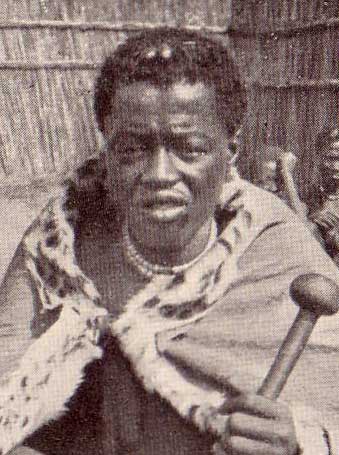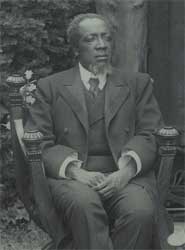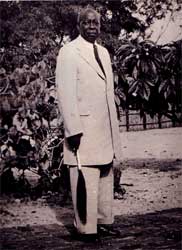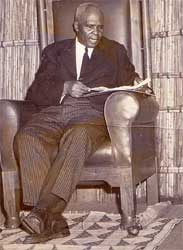
barotseland.net









|

Litunga Lewanika and Litunga la Mboela, Matauka, 1880s
|
barotseland.net
Living History of the Lozis Project
|

Litunga la Mboela Makwibi, Sambi and Indunas, 2001
|
|
Royalty in the lands of the Lozi
How should we understand African kings, queens, princes, princesses and royalty generally and should these understandings be different from those attaching
to Euro/Asian monarchs? African monarchs are not just chiefs or elders as African monarchical influence and the exercise of that influence is usually
more universal and wide-ranging than that of a mere chief as such monarchs are seen not only as disseminators of power and wealth but also as keepers and
guardians of culture, 'national' (not to be confused with modern state) identity and pride. There is usually a hereditary aspect to the lineage which may
or may not align with Euro-Asian concepts.
We perhaps need to contextualise this question of African monarchical identity in terms authochthonous , pre-colonial and/or hereditary
African
leadership and authority systems, that, importantly, predate European influence whilst, today, we need to consider their influence on the
construction of a
Diasporal imagination. *
In the case of the Lozi peoples of the Upper Zambezi Valley, a king - known locally as Litunga - which, in English, loosely means
keeper of the earth, has not only ruled over, but led and inspired the peoples of the Lozi sphere of influence since earliest times. The Litunga has
ruled, once again since earliest rcorded times (history handed down orally) asisted by what is today called the Barotse Royal
Establishment (BRE), comprising a Prime Minister (Ngambela),
senior Indunas responsible for different aspects of government, and a network of royal influence with royal princes and princesses stationed at
strategic locations throughout the kingdom. This network of royal power remains to this day, the most persuavive form of governance in the lands of the
Lozi in the Upper Zambezi River valley, respected throughout the Lozi diaspora and beyond, amongst other peoples. Each Litunga is directly descended from
previous Litungas or brothers
to Litungas. Since the time of Mulambwa, all Litungas descend from that Litunga, and since Lewanika, this has narrowed to the direct descendants of that
Litunga through four of his sons (Yeta III, Imwiko I, Mwanawina III and Mbikusita) who have all ascended to the Kingship and from whom election takes
place to appoint a new Litunga upon the death of an incumbent. This election takes place for princes who have been nominated for the elevation. It is
unlikely though not impossible that a prince of a line of the preceding Litunga will be elected directly after the death of his father from the same line
of descent from Lewanika
In Lozi society there is a social class division between 'royals' and 'commoners' which plays out in several social, political and economic aspects, not
least in terms of what might be termed 'opportunities.' This distinction has always been a feature of Lozi society.
In the colonial era, such a strong
traditional ruler could sometimes be co-opted by European vectors of power or 'worked with' in order to suit colonial aspirations such as the paying of tax
and export of labour to mines and plantations elsewhere. This was known as 'indirect rule'which had been practised for centuries, not least in Africa,
but became a regular feature, especially of the British colonial enterprise, promulgated as a political doctrine by Frederick Lugard, High Commissioner to
the Protectorate of Northern Nigeria from 1899-1906. It was certainly a feature of the colonial period in Barotseland which underwent considerable
underdevelopment and diminution of royal power during the that era. After the independence of the Republic of Zambia in November 1964, into which
Barotseland was persuaded to enjoin,
the Kingship in Barotseland, in the person of Litunga Mwanawina III, knighted by the British monarchy, whose powers had been much weakened by classic
colonial underdevelopment, was pressured, not least by the British Government, as an unwilling accomplice, into agreeing to the
incorporation of Barotseland into Zambia under what was known as The Barotseland Agreement 1964, with the Litunga retaining Kingly roles, albeit with
considerably circumscribed powers. Today, the Kingship and the BRE endure in an uneasy, mutually dependent co-existence with the Zambian Government. Since
the abrogation of the Barotseland Agreement in 1969 by the Zambian founding President, Kenneth Kaunda, there have existed elements in Lozi royal
society unhappy with the political status quo whilst the vast majority of Lozis, many of whom work elsewhere and have intermarried with other groups,
sometimes fear the machinations of these disaffected elements or feel compelled to assign fealty. In many parts of the world, a monarchy is seen as an
anachronism, to be institutionalised more as a cultural relic but his is not yet the case in Barotseland.
See: Flint, L.S. (2010) Historical Constructions of Postcolonial Citizenship and Subjectivity: The
Case of the Lozi peoples of Southern Central Africa, Lambert Academic Publications, Saabrücken, Germany ISBN 978-3-8433-6703-5.
* Williams, A. (2004) 'On The Subject Of Kings And Queens:
Traditional African Leadership And The Diasporal Imagination,' African Studies Quarterly, 7, 59-67.
Litungas of Barotseland
The title 'Litunga' is that of the Lozi king and means 'keeper' or 'owner of the earth' signifying that the King of the
Lozis is caretaker of all the lands of the Lozi kingdom.
The first monarchs of the Luyi people who were the ancestors of the Lozi peoples present today in Barotseland were women who led the Luyi when they first
arrived on the Bulozi flood plain after a staged migration from the Lunda-Luba empire of the Katanga region in present day Democratic Republic of Congo (DRC).
The earliest known of these queens is remembered by the name of
Mwambwa who bore a daughter called
Mbuyu-wa-mwambwa - 'Mbuyu of Mwambwa'shortened to Mbuwamwambwa. It is from these two
queens under whose leadership the Luyi are said to have settled in Kalabo district that the line of kingship evident up to today can be traced.
During the reign of Mbuyu, one of her sons, Mboo was selected to be the first male monarch and from that time forwards, only males have occupied the
Kingship. The dates of the reigns of the various kings are vague up to the time of Lewanika.
Here is a list of Litungas and other senior royal positions in chronological order starting with the first. That is followed by a list of Litungas of the
southern part of Barotseland, subordinate to the principal Litunga. The reader might wish to consult
other historical records offered in other places for comparison.
- Mboo - also: Muyunda Mwanasilundu - Son to Mbuywamwambwa - Mboo may have been a nickname added after his overdue birth (Mwanasilundu -
literally a child who came late).
- Inyambo - older brother to Mboo; son to Mbuywamwambwa.
- Yeta I - son to Mwambwa; uncle to Mboo and Inyambo; brother to Mbuywamwambwa.
- Ngalama - nephew to Yeta I; son to Prince Ingalamwa, said to have been adopted by Litunga Inyambo.
- Yeta Nalute - son to Ngalama.
- Ngombala - son to Ngalama.
- Yubya - grandson to Ngombala, son to Prince Mbanga, Mulena a Nalolo.
- Mwanawina I - brother to Yubya; son to Prince Mbanga, Mulena a Nalolo.
- Mwananyanda - son to Mwanawina I
- Mulambwa - known to Livingstone as Santulu - son to Mwanawina I: c1780-c1830 - dates uncertain.
- Silumulume - son to Mulambwa - ruler of the north - Namuso: dates uncertain.
- Mubukwanu - son to Mulambwa - ruler of the south - Lwambi: possibly 1830-1838, much of this rule in exile.
(Ma)kololo interregnum: circa 1830 to 1864
- Sebetwane: died 7th July 1851.
- Mamochisane - daughter to Sebetwane: 1851-2.
- Sekeletu - son to Sebetwane 1852-1864.
- Mamili - possibly uncle to Sekeletu; possibly brother to Sebetwane: 1863.
- Mbololo - brother to Sebetwane 1864-1864.
- Sipopa - son to Sebeso, grandson to Mulambwa - (formerly Lutangu): 1864-1876

- Mowa Mamili (Regent): 1876
- Mwanawina II - son to Mubukwanu: 1876-1878

- Lubosi - grandson to Mulambwa; son to Prince Litia: (first period of rule) 1878-1884 (b. c1842 d. Feb. 1916)

- Tatila Akufuna - son to Prince Imbua, grandson to Mulambwa: 1884-1885

- Lubosi (second period of rule) - became known as Lewanika 'the uniter': 1885-1916

- Litia - became Yeta III - son to Lewanika: 1916-1945 (June)

- Imwiko - son to Lewanika 1945-1948 (June)

- Mwanawina III - son to Lewanika: 1948-1968 (b. c1888 d. 13th Nov 1968)

- Mbikusita - son to Lewanika: 1968 (15th Dec)-1977 (b. c1907 d. 1977)

- Ilute - also known as Yeta IV - son to Yeta III: 1977-2000 (d. 7th July 2000)

- Lubosi Imwiko II - son to Imwiko I: 2000 (October) - presently (in January 2021) reigning.
Litunga(s) la Mboela - Litunga(s) of the south - (also referred to as Malena a Nalolo)
Litunga la Mboela is, since the succession conflict following the death of Mulambwa which weakened the kingdom of Barotseland to the
point that it became vulnerable to invasion by the Makololo, a Mulena Mukwae (princess chief) ruling over the southern part of Bulozi who, in the
contemporary era at least, is simultaneously Regent Princess of Barotseland. The logic of this change of gender was that the monarch of the southern part
of the kingdom would never again challenge for supremacy of the whole kingdom, ruled over from the north (Namuso).
In the earliest manifestation of this role, for most of the year
this Litunga would be based at Nalolo, a village on the main Lyambai (Zambezi) channel. Nalolo remainsthe traditional capital
of the south and second most important royal centre of Barotseland, but in the flood season, the Litunga la Mboela proceeds by means of her own Kuomboka
in her own
Nalikwanda barge to Muoyo on the eastern margin of the flood plain. In practice today, this Litunga lives permanently at Muoyo as the buildings at Nalolo
are subject to inundation and are in need of refurbishment.
The incumbent of this position prior to the present office holder, the Mokwae Makwibi, detailed in the list below, was
the Litunga la Mboela from 1958 and was highly respected. She bore witness to four principal Litungaships. The Prime
Minister of the southern kingdom is called Sambi who heads a Kuta and Indunas at Nalolo/Muoyo.
This Kuta is made up of occupants with titles similar to those of the Saa Sikalo Kuta at Lealui/Limulunga.
The following list of occupants of the title Litunga la Mboela are female unless otherwise stated
- Notulu - daughter to Mwanambinje, wife to Litunga Ngalama
- Mbanga (male) - son to Litunga Ngombala
- Yubya (male) - son to Mulena Mbanga
- Nakambe (male) - son to Mulena Mbanga
- Mwanamatia (male) - son to Mulena Mbanga
- Kusiyo (male) - son to Mulena Yubya
- Mubukwanu (male) - Prince who fought and won against his brother Silumelume in the succession battle following the death of their father, Mulambwa. This was immedaitely followed by
defeat to the forces of Sibituane and his Makololo hordes
Makololo interregnum
- Mulena Mukwae Kandundu
- Mulena Mukwae Kaiko
- Mulena Mukwae Mwangala
- Mulena Mukwae Matauka - sister to Lubosi I / Lewanika
- Mulena Mukwae Maibiba - sister to Tatila Akufuna
- Mulena Mukwae Matauka - sister to Lubosi I / Lewanika
- Mulena Mukwae Atangambuyu
- Mulena Mukwae Mulima
- Mulena Mukwae Makwibi - sister to Mwanawina III: 1958-2010
- Mulena Mukwae Mbuyu - sister to Lubosi Imwiko II: 2011 to date
|
|
 back to the top back to the top
Copyright: barotseland.net 2021
|
|












 back to the top
back to the top









